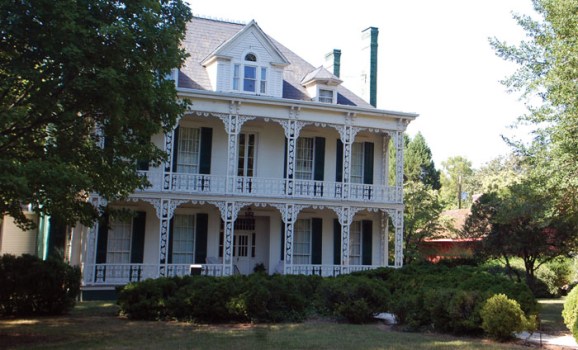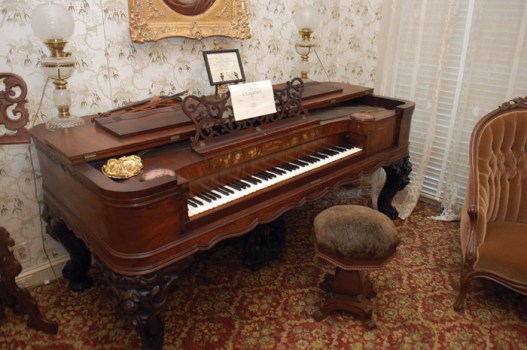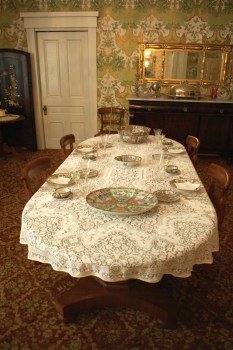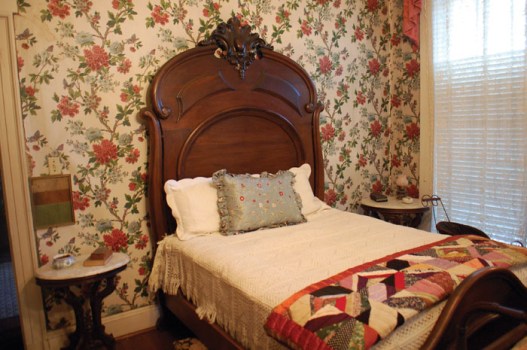Special delivery: Descendant donates important pieces of family furniture to Hall House museum
Published 12:00 am Sunday, September 22, 2019
By Mark Wineka
mark.wineka@salisburypost.com
SALISBURY — The delivery truck arrived at the Hall House Tuesday afternoon, and board members and staff of Historic Salisbury Foundation were there to greet it with grateful arms.
The truck from California carried precious cargo — three pieces of furniture that belonged to descendants of Dr. Josephus W. Hall, for which the foundation’s prized house museum at 226 S. Jackson St. is named.
They came from Fan Moberg and her husband, Jim, who live near San Francisco. The pieces included a dining room table, a bed and a piano stool — all pieces dating back to the 19th century period when Hall occupied the house and all are thought to be original to the home when Dr. Hall lived here.
“We were so excited when it came,” Sada Stewart, executive director of Historic Salisbury Foundation, said of the delivery truck’s arrival. “It’s pretty special.”
Fan Moberg is the great-great-granddaughter of Josephus Hall. Her grandmother, also named Fan, or Fannie, was a daughter of Henrietta, who was a daughter of Dr. Hall and his first wife, also named Henrietta.
Over the years, despite the distance they have to travel, the Mobergs have been frequent visitors to the Hall House, especially when OctoberTour takes place.
This year’s OctoberTour will be Oct. 12-13, and the Mobergs have told the foundation they plan to attend. The foundation board members and staff would love to learn a bit more background on the table, stool and bed.
This past week, as they moved the new additions into place in the Hall House, there was still some debate as to exactly what kind of wood they were seeing.
A consensus for now is that the dining room table is probably oak.
“This grain looks oakish,” board member Steve Cobb said, taking a look Thursday afternoon under the lace tablecloth. The museum already has the table set for four, and the foundation is using dining room chairs it already had.
“It’s in great condition,” Stewart said of the table.
Guesses of mahogany, walnut and even cherry have been mentioned for the ornate headboard of the bed, whose size is a double.
The Mobergs even sent a more modern day box spring and mattress for it.
Cobb, Stewart and Ken Faggart put the bed together, and it now has a place in what previously has been considered and decorated as a children’s bedroom, though there’s still debate as to which of the front upstairs bedrooms the Halls used for the master bedroom.
“I think further research is what we really need to do,” Stewart said, “but that’s the fun of it. We get to know more about the home than you did before.”
In a front downstairs parlor, the piano stool has been placed in front of the 1860 Henry Gaehle piano from Baltimore. On display on top of the piano is a receipt for Hall’s purchase of the piano for $380.
The piano and stool sit under a portrait of Henrietta Hall, Dr. Hall’s first wife.
Visitors to OctoberTour will be able to see all of the house’s many historic furnishings, including these additional family pieces.
The house’s furnishings reflect both antebellum and Victorian periods, and parts of the city’s Civil War history can be told with Dr. Hall as a focal point, because he served as a surgeon for the Salisbury Confederate Prison.
The house dates back to 1820, but it was originally built as classrooms for the Salisbury Female Academy. The school lasted only five years before the house became a private residence for Rebecca Troy and her half-brother, businessman Maxwell Chambers.
Chambers later married and moved farther down Jackson Street. Troy also wed and moved out of the house in 1840. It was sold to a Sheriff Chaffin of Davie County, who never lived in the house but rented it out.
Hall purchased the home in 1859. He had attended the boys academy in Salisbury in 1823 and was a native of Rowan County, but for several decades he moved west to pursue a career as a doctor.
He studied and worked in Lexington, Frankfurt and Louisville, Kentucky, married Henrietta in 1836 and lived three years overseas, continuing his medical studies in Paris and London.
When he returned to the States, he practiced in Missouri, had a hand in starting Kemper College’s medical school, then became a lecturer and professor at the University of St. Louis Medical College from 1841-49.
Hall lost his wife, Henrietta, and their daughter, Josephine, to a cholera epidemic in St. Louis in 1849.
As a widower, Hall returned to Salisbury in 1851 with two children — Henrietta and Stockton. He had made most of his wealth in St. Louis by buying and selling property, and in Rowan County, he mainly dealt in real estate beyond his medical duties durign the Civil War.
Hall married Mary Cowan in 1853. She also was prosperous, and the Halls lived with her parents until they bought the South Jackson Street home in 1859 for $3,500.
They actually purchased the whole block, which included stables, a carriage house and slave quarters. Dr. Hall paid for and added the decorative ironwork facade, which came from St. Louis. It cost $125 in 1859.
The Confederacy commissioned Hall as surgeon for the prison in 1861, and he also served as physician for various wayside hospitals for the sick and was chief surgeon at Confederate General Hospital in Rowan.
The Union soldiers who invaded Salisbury at the war’s end occupied the Hall House and paid the family rent, taking up half of the house with the Halls living in the other half.
Four generations of the Hall family lived in the house before Historic Salisbury Foundation purchased it in 1972, along with many of its original furnishings.
A framed copy of Hall’s official pardon from President Andrew Johnson for Hall’s role in serving the Confederacy as a prison physician hangs in the upstairs hall. Dr. Hall died in 1873.
Contact Mark Wineka at 704-797-4263.






